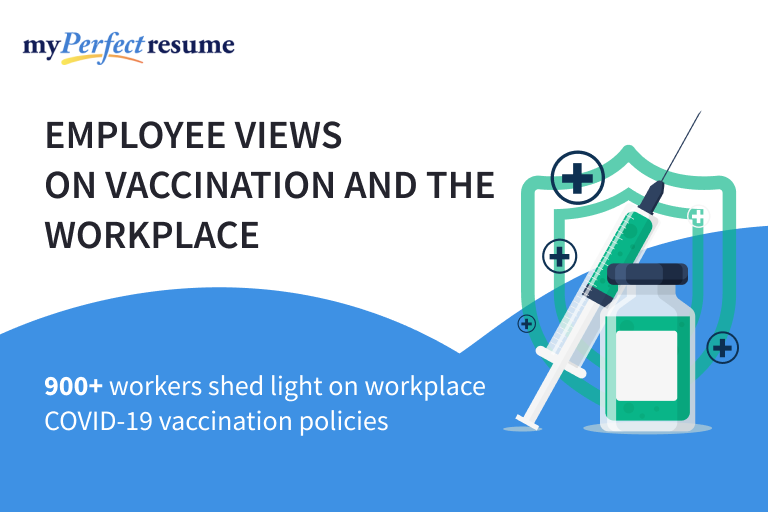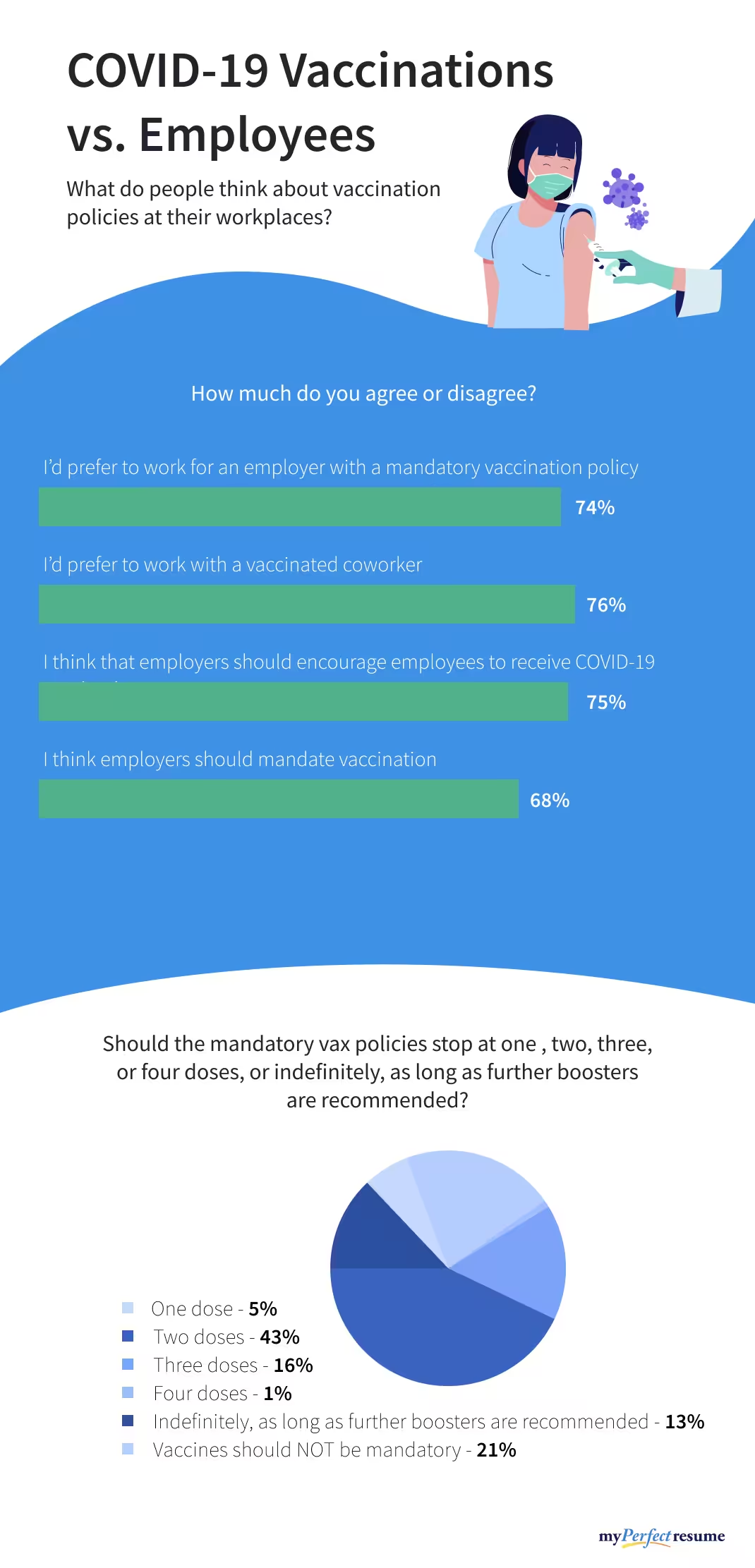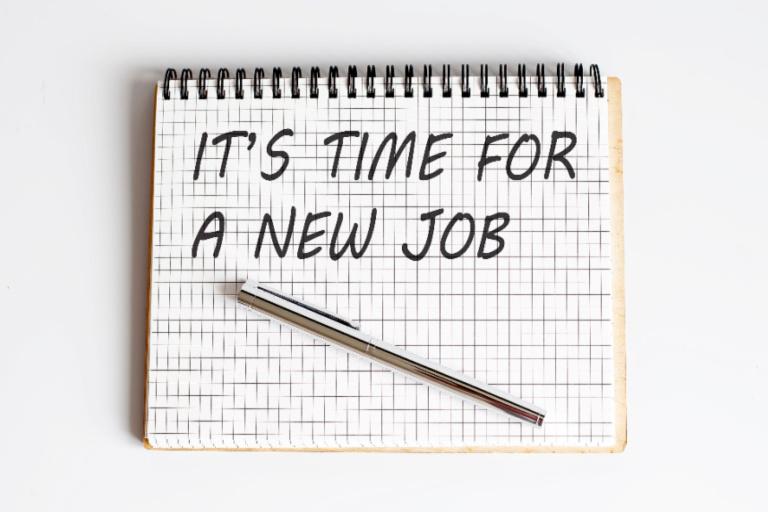Opinions on Vaccination & Employment
MyPerfectResume.com [January 07, 2025],
[https://www.myperfectresume.com/career-center/careers/planning/vaccination-and-employment]

Our customers have been hired at: *Foot Note
Welcome to the jungle—the third year of the global COVID-19 pandemic.
Meet Tom, a typical corporate employee who was one of the first to be vaccinated against coronavirus in his workplace.
Now, let me introduce you to Adam. Tom’s coworker, or in fact, his desk mate. Unvaccinated by choice.
Now that you know our protagonists, the question is: should they sit together in one room?
Probably not. Or maybe yes? Well, who should decide? Government? Employer? Tom and Adam themselves?
The COVID pandemic is still out there. But it was months ago when we started accepting our situation and calling it the “new normal.” COVID-related themes are no longer sensational. Unless someone tells us to get vaccinated. And that someone is our employer.
At MyPerfectResume, we polled 900+ Americans to shed some light on vaccination policies at their workplaces.
- Are US employees vaccinated because their employees told them to do so?
- Do they refuse to work with unvaccinated coworkers?
- Is being unvaccinated a reason to be fired?
- Is it discrimination to not hire an unvaccinated candidate?
Stay with us to find out.
COVID-19 vaccination rate
“We will not end the pandemic anywhere unless we end it everywhere,” said Dr. Tedros Adhanom Ghebreyesus, Director-General of the WHO.
These words remind us that accessibility to vaccines was critical in the earlier stages of the pandemic, and still is. And with the unpredictable spread of new variants, they’ll remain crucial for the foreseeable future.
Since the release of coronavirus vaccines, many American citizens have decided to take the shot. According to the CDC's data, as of April, 66% of the country’s population had been fully vaccinated. The top three states with the highest vaccinations rate are Rhode Island, Vermont, and Maine. That means nearly 80% of each state’s population is vaccinated.
Obviously, there is no shortage of vaccination opponents either. And maybe they live primarily in Mississippi, Wyoming, and Alabama, as these states have the lowest vaccination rates of approximately 50%.
These are general CDC data. Now, let MyPerfectResume’s findings shed some light on employees’ COVID-19 vaccination statistics.
Most respondents want to end the pandemic and play their part with a high vaccination rate.
The infographic above shows that 83% of survey takers are vaccinated against COVID-19.
They decided to be an active part of global solidarity in the struggle against the pandemic. And they made that decision on their own. 90% admit they got vaccinated entirely of their personal choice. Only in the case of 1 in 10 respondents was their decision influenced by external factors.
Considering that no one is safe until everyone is safe, our respondents treat COVID vaccination as a serious duty. They are global citizens responsible for ramping up this largest immunization campaign in history. Thus, 78% believe that COVID-19 vaccines should be mandatory.
But, as we mentioned before, COVID vaccines also have their opponents. 1 in 5 of our respondents oppose mandatory vaccination. We didn't ask about their reasons for that, but the United States Census Bureau did. According to its data, people didn't decide to take a shot because they, for example:
- had concerns about possible side effects of the vaccine (50%)
- didn’t trust the vaccine (42%)
- didn’t trust the government (35%)
- believed they don’t need the COVID-19 vaccine (32%)
- planned to wait and see if it’s safe (28%)
- didn’t know if the vaccine would protect them (23%)
Do vaccinated people respect their views? Do they show understanding for those who choose not to vaccinate? Are they treated the same as other vaccinated people?
Or…
Is there discrimination against the unvaccinated?
You’ve wondered if unvaccinated people are treated the same as vaccinated people. Some would argue they should be, whether they are in a store, at an airport, in a museum, or, especially, at their workplace. MyPerfectResume research discovered that’s not necessarily true.
- 57% of employees said that their coworkers are discriminated against if they are not vaccinated.
- At the same time, 68% of respondents observed that people employed at their company are treated better if they are vaccinated.
- 44% of unvaccinated respondents revealed that they had experienced discrimination at work due to not being vaccinated.
- 61% of vaccinated respondents would refuse to work with an unvaccinated coworker if they could.
That’s striking. Undoubtedly, whether vaccinated or not, every employee should be treated equally by their employer and coworkers. But COVID changes that. People are worried about their safety, loved ones' health, and in some cases, even their lives. No one wants to catch and spread this disease.
This situation also affected employers. Poor economic conditions, closed factories, labor shortages, and high infection rates among workers were examples of the pandemic’s negative impact on businesses.
As a result, employers and employees started to pressure unvaccinated coworkers. Their goal was to persuade them to change their decision and take the shot.
Consequently, some respondents have encountered negative experiences. They told us about it in their own words.
I was blamed when someone got sick.
Coworkers refused to work next to me.
People avoided me and made me wear a mask.
My boss has made negative comments about people who aren't vaccinated, saying that such people are ignorant.
I received a lot of pressure from upper management and have been limited in my movements between offices.
I had to put on record "explaining myself" why I'm not vaccinated.
These are just some of the unpleasantries that were shared with us.
Unfortunately, our respondents also experienced layoffs. There were individual instances when employees admitted that they were fired. According to them, the reason was the lack of vaccination and refusal to take the dose. Survey takers were also threatened with dismissal if they did not take the vaccine.
This is what the situation looks like for the unvaccinated.
But can we say something about discrimination against vaccinated people? Well, there is one thing. We asked unvaccinated respondents if they would refuse to work with a vaccinated coworker if they could. 42% said “yes.” Interesting, right?
Our study reveals much more about workplace vaccination policies and people’s attitudes towards them. So keep scrolling.
Employers & vaccinations
Policies regarding pandemic restrictions and vaccinations themselves vary from company to company. Besides the need for social distancing and using sanitizers, some employers don’t implement any COVID policies. They also don't engage in the vaccination debate, giving employees a free choice.
But some companies take a completely different attitude. They impose strict regulations, but they also actively encourage employees to vaccinate.
As a result, 82% of respondents admit that their employers encouraged them to get vaccinated against COVID-19.
Moreover, 72% say that their employers have a mandatory vaccination policy.
Others also report similar results.
Risk management and advisory company Willis Towers Watson, indicated last year that 57% of all respondents (employers) either required or planned to require COVID-19 vaccinations. Manpower came to a similar conclusion saying that nearly two-thirds of US companies planned to require at least some of their workers to get vaccinated.
Perhaps these high numbers result from state governments’ actions mandating vaccinations among state employees.
But how do employees feel about their employers requiring them to receive the COVID-19 vaccination?
As you can see above, they mostly like the idea. 38% are strongly in favor, while 30% favor employer-mandated vaccinations. 16% of respondents are strongly opposed or opposed, while 16% are neutral.
What about quitting if the employer introduces obligatory corona vaxes? Around 3 out of 10 respondents, 28%, said they’d leave if their employer mandates vaccination. That might not seem like a lot, but in sectors affected by the ongoing Great Resignation, this might just be a tipping point with serious consequences. A statistics to bear in mind when considering a policy on vaccination.
Considering a change from you current role? Take a look at our guide on how to write a letter of resignation.
That said, the above results leave no doubt that most US employers support vaccinations. So do most employees. Let’s dig deeper and gain some insight into their perspective.
Employees & vaccinations
The results presented in the infographic are not surprising. Employees value a COVID-safe workplace achieved thanks to many vaccinated workers.
- 74% prefer to work for an employer with a mandatory vaccination policy.
- 76% prefer to work with a vaccinated coworker.
- 75% think that employers should encourage employees to receive the COVID-19 vaccine.
- 68% think employers should mandate vaccination.
We also asked how many doses of coronavirus vaxes should be mandatory.
- 43% say that two mandatory doses are enough.
- 16% would go for three doses.
- 13% are convinced that we should take as many doses as further boosters are recommended.
- 5% believe one dose is acceptable.
- Only 1% of respondents opt for four doses.
- Moreover, 21% are opposed to mandatory vaccination.
The largest group of respondents believe that two doses should be mandatory. This opinion is consistent with general recommendations.
The bottom line is that even if you’ve had COVID-19 before, you have to get vaccinated, and you should get both of the shots.
Dr Galit Alter, a professor of medicine and a group leader at the Ragon Institute of MGH, MIT and Harvard
Now that we know a bit about employees' and employers' attitudes onward workplace vaccinations policies let's explore one more work-related aspect.
COVID recruitment
Yes, COVID changed the recruitment process.
For the first time, employees started to be recruited mainly remotely. HR departments had to adapt the whole recruitment process to pandemic restrictions. And some included new questions and requirements. Namely, the need to disclose one’s vaccination status.
Let’s check how covid recruitment looks in numbers.
A little background before we start with numbers. In September 2021, Occupational Safety and Health Administration (OSHA) issued a temporary emergency standard saying that all companies with at least 100 employees must ensure that their workers are fully vaccinated. Otherwise, unvaccinated workers must be tested for COVID-19 at least weekly.
Undoubtedly, employers motivated by the decisions of the U.S. government decided to impose vaccine mandates.
Looking at the infographic, we can see that 72% of respondents admit that their employers require candidates to include their vaccination status as part of the recruitment process.
According to HR experts, it's both good and bad.
On the one hand, [vaccine requirements] will push some people out and keep some people from applying, but on the other hand, people who have safety concerns may be more likely to return to the office or seek out an employer with a vaccine mandate. You lose some people but potentially attract other people.
Jamie Kohn, research director for the HR practice at research and advisory firm Gartner.
And what do our respondents think about this situation?
61% believe that employers have the right to reject candidates if they don’t include their vaccination status on their resumes.
Meanwhile, 63% agree that the rejection of unvaccinated candidates is discrimination.
Thanks to COVID vaccination policies, worker democracy is also emerging. 63% of our respondents say that HR Departments should consult their decision with the rest of the employees before hiring unvaccinated candidates.
Tara Cassady, executive vice president at recruitment process outsourcing firm Cielo in Brookfield, points to this last observation in particular. According to Cassady, “talent acquisition leaders can start by assessing the current state of vaccination at their organization. Doing so can help prepare for potential resignations, although research shows that most employees support vaccine mandates.”
Indeed, recruitment processes will never be the same again.
Key takeaway
US employees and their employers believe that vaccines against COVID are crucial to ending the pandemic and returning to normal life. This is why:
- 83% are vaccinated against COVID-19, and 90% did it entirely of their personal choice.
- 78% believe that COVID-19 vaccines should be mandatory.
- 72% say that their employers have a policy of compulsory vaccination.
- 74% prefer to work for an employer with a mandatory vaccination policy.
- 72% say that their employers ask candidates about their vaccination status during the recruitment process.
Let’s summarize all that was said before with Dr Galit Alter’s words:
“If we could turn COVID-19 into a cold for the whole world, I think we could live with that, right? That would get us out of masks, back into our barbecues with our friends and back into churches, synagogues and mosques — wherever we wanted to go. If you have the option to get a COVID vaccine, get it.”
Methodology
The findings presented were obtained by surveying 920 American respondents. They were asked questions relating to their experiences and attitudes towards workplace vaccination policies. These included yes/no questions, open-ended questions, scale-based questions relating to levels of agreement with a statement, and questions that permitted the selection of multiple options from a list of answers.
Limitations
The data we are presenting relies on self-reports from respondents. Each person who took our survey read and responded to each question without any research administration or interference. There are many potential issues with self-reported data like selective memory, telescoping, attribution, or exaggeration.
Some questions and responses have been rephrased or condensed for readers' clarity and ease of understanding. In some cases, the percentages presented may not add up to 100 percent; depending on the case, this can be due to rounding, or due to being part of a larger statistic, or due to responses of "neither/uncertain/unknown" not being presented.
Fair Use Statement
Vaccinated or not, don't miss the chance to share these findings–you might regret it! If you think your audience will be interested in this information, you can share it for noncommercial reuse. In return, all we ask is that you link back to this page so that your readers can view the full study.
About Us
At MyPerfectResume, we recognize the evolving landscape of COVID and the concerns regarding employer vaccination policies. Our comprehensive resources, including resume samples (written by certified resume writing professional), versatile resume templates, and a user-friendly resume builder, equip you with the tools to showcase your skills and navigate the job market if these challenging times result in unemployment. Explore our resources and create a standout resume that highlights your qualifications, helping you secure the job you desire. Start building your future today.
How we reviewed this article
Since 2012, we have helped more than 11 million job seekers with our user-friendly tools and career advice articles. We have a rigorous editorial process to ensure that our content is helpful and accurate. Explore our recent employment studies and press coverage, and discover why our certified career experts are a trusted source for professionals worldwide.
Sources
- Calina, D., et al., “Towards effective COVID‑19 vaccines: Updates, perspectives and challenges”
- CDC, “COVID-19 Vaccinations in the United States”
- COVAX, “COVID-19 vaccine doses shipped by the COVAX Facility head to Ghana, marking beginning of global rollout”
- International Center for Journalists, “Understanding How COVID-19 Vaccines Work”
- Manpower Group, “How To Build Your Federal Vaccine Mandate Workforce Strategy”
- Maurer, R., “Hiring with a Vaccine Mandate? Be Clear About Expectations”
- Office of Financial Management, “State employee vaccination verification data”
- Stacey, K., “Two-thirds of US companies demand staff have Covid vaccinations”
- United States Census Bureau, “Household Pulse Survey Shows Many Don’t Trust COVID Vaccine, Worry About Side Effects”
- WTW, “Over half of U.S. employers will require employee vaccines, Willis Towers Watson survey finds”
Our customers have been hired at:*Foot Note










